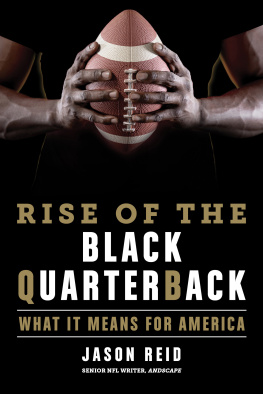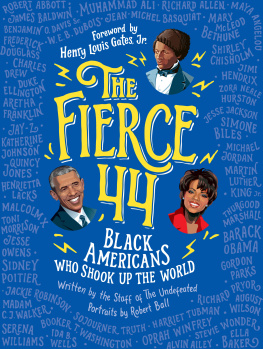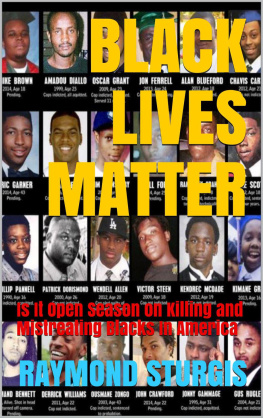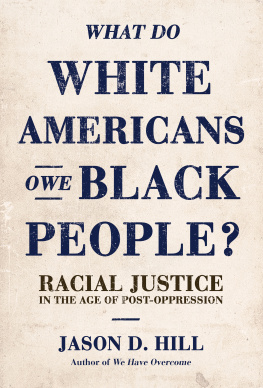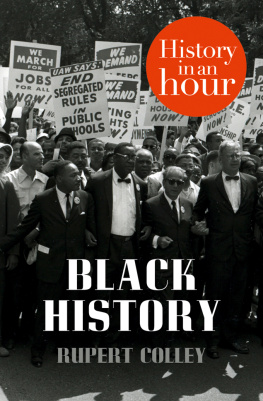Contents
Guide
Copyright 2022 by Jason Reid
All rights reserved. Published by Andscape Books, an imprint of Buena Vista Books, Inc. No part of this book may be reproduced or transmitted in any form or by any means, electronic or mechanical, including photocopying, recording, or by any information storage and retrieval system, without written permission from the publisher. For information address Andscape Books, 77 West 66th Street, New York, New York 10023.
Photography Credits: Carl Iwasaki/Contributor; Focus On Sport/Contributor; Associated Press; George Gojkovich/Contributor; Focus On Sport/Contributor; Patrick Smith/Staff; Robert Reiners/Stringer; Jamie Schwaberow/Stringer; George Gojkovich/Contributor; George Gojkovich/Contributor; Richard Rodriguez/Stringer; Associated Press; Keystone/Staff; Michigan State University; Donald Miralle/Stringer; Mitchell Layton/Contributor
Designed by Amy C. King
Library of Congress Cataloging-in-Publication Control Number: 2022935339
hardcover ISBN 978-1-368-07662-3
eBook ISBN 978-1-368-08217-4
Visit www.AndscapeBooks.com
FOR JOSH AND MAYA
Contents
AS DINNER WAS WINDING down and three NFL colleagues prepared to depart a popular Northern Virginia steakhouse, the most prominent among them offered one final observation. And when Doug Williams talks, well, people listen.
It was July 2019, and Williams, the first Black man to both quarterback a team to a Super Bowl championship and win the games Most Valuable Player Award, still cut an imposing figure nearly 30 years after he last took a snap from center. Even seated, at a muscular 6 foot 4 with a booming voice, Williams commanded the room, let alone the dinner table.
This had been the last chance for the small group to fellowship over a good meal before embarking on another journey. Sharing seafood and laughs over several hours, the men would all, in different capacities, soon begin the grind of the NFL season. They discussed the upcoming season, of course, but Williams also often steered the conversation to the most important topics affecting Black men in the NFL, which were meaningful to him as much because of his role as a high-ranking executive for Washingtons NFL franchise, the same franchise he led to Super Bowl glory as a young man, as his standing as an African American icon. Not surprisingly, Williams that night was especially interested in the state of play at the most important position in professional sports: quarterback.
Quarterbacks are the most celebrated players in football and among the most scrutinized and highest-paid in professional sports. The QB, as the position is commonly known, has an outsized role in determining a teams success. Quarterbacks are at the center of the action on offense, barking out directions through play calls, handling the ball on almost every snap and passing it often in the pass-heavy NFL. From the lowest levels of youth football through high school, college, and the NFL, star quarterbacks are the face of the game. A franchise QB is a passer considered to be so talented that team owners build their clubs around them in pursuit of long-term success. Major decisions both on and off the fieldroster construction, offensive philosophy, marketing strategies, etc.are made to capitalize on a franchise QBs strengths.
As NFL team owners sought to expand the leagues popularity through the decades, with an emphasis on filling their franchises coffers by securing bigger television contracts, they approved rule changes intended to increase scoring, which excites fans. Quarterbacks benefitted most from the changes. Game officials afforded them more protection than other players while restrictions were placed on the defense in its efforts to cover a QBs targets. The adjustments produced the owners desired effect: The passing game took off, scoring increased, the NFL became king among the major professional sports leagues, and quarterbacks ascended to a position of prominence in popular culture, once the exclusive domain of male movie stars. In a white, patriarchal society, the QB has come to personify the ideal form of masculinity. In professional football, a sport full of alpha males, the QB is king. Hes a matinee idol, the smartest guy in the room and the coolest to boot. Hes everything the average guy wishes he could be but cant.
Despite all this focus on the position, for decades, NFL quarterbacks were not always the most gifted athletes on the team. There had been one requirement, never plainly stated, that the games owners and coaches had insisted on, an attribute that had nothing to do with talent: whiteness.
That fact of history, a history both distant and recent, was the context, the undercurrent, and the 300-pound gorilla lurking in the room among the white linen and fine china.
Although the other two men present at the gathering were also football lifersWilliams was flanked on one side by a top league public relations official and on the other by a longtime NFL writerWilliams was, by far, the most qualified to evaluate the games best passers. And he did, commenting in general on future Hall of Famers Tom Brady, Aaron Rodgers, and Drew Brees, among others. Then, shortly before the party dispersed into the night, Williams reignited the QB portion of the conversation. He had been holding his most salient consideration until the endthe fast-rising newcomers who were pushing the old guard: a cadre of elite Black signal-callers.
You look at these young guys, you look at their talent, what theyve done so far and where they are right nowits gonna be something different this year, Williams said. Youre gonna see these young guys really do some things. Theyre gonna show where they are. We havent seen it before. Itll be new.
And with that, he was done. It was more of a declaration than an observation. His comments inspired further discussion at the tableas well as a few eye rolls. Williams being bullish on the potential of Black QBs was nothing new. He rooted for them as if they were part of his extended family. And given what he endured to help light their path, it wasnt surprising that he embraced the cheerleader role. But his optimism sometimes outpaced the results of those he promoted.
Not this year. The unfolding months would prove Williamss assessment of the state of Black NFL QBs was supported by fact. As the 2019 NFL season drew near, the league had never had more talented African American passers playing at one time in the games 100-year history. All still were young; none had yet peaked. The previous season, Patrick Mahomes of the Kansas City Chiefs had won the Associated Press Most Valuable Player Award. Perennial Pro Bowler Russell Wilson, then the only other Black QB to have started in a Super Bowl victory, was still going strong. Deshaun Watson of the Houston Texans and Dak Prescott of the Dallas Cowboys also were voted to Pro Bowl teams. Lamar Jackson of the Baltimore Ravens was coming off a promising rookie season. Heisman winner Kyler Murray, the No. 1 overall pick in the 2019 NFL draft, would be the Arizona Cardinals starter. Williams, though, wasnt merely saying that those young men would continue to play well in the upcoming season. He expressed confidently, some would have said foolishly, that the NFL, then on the eve of its 100th season, was at the threshold of a new era on the field: the era of the Black quarterback.

